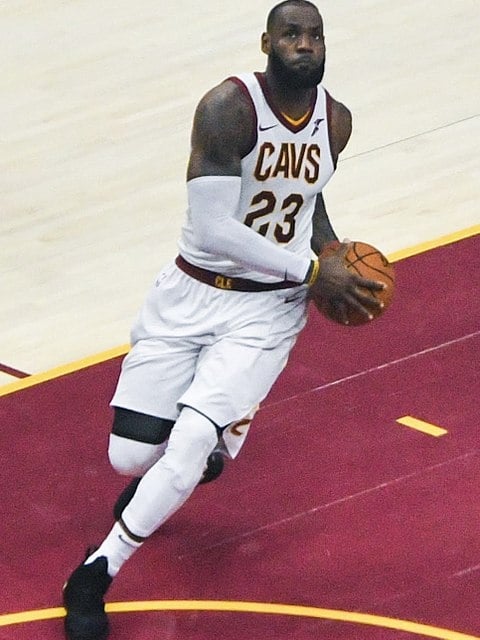You have /5 articles left.
Sign up for a free account or log in.

LeBron James
Wikipedia
The Cleveland Cavaliers juggernaut LeBron James and the everyday academic. Is it possible to pick two more different individuals in the world? For the sake of argument, I will insert myself into the role as the academic so as not to offend any colleagues who might consider themselves to be very much like King James.
Also, in the interest of full disclosure, I must mention that I have never been a LeBron fan … as an academic I am not supposed to follow sports, right?
The real reason I have not been a fan, though, is simply because LeBron has crushed my Indiana Pacers’ hopes of going deep into the playoffs for far too long. Regardless of how you see yourself (as an academic and a Cavaliers lover or hater), please indulge me for a few minutes, because I believe that many academics can learn from LeBron’s herculean recent efforts in this year’s National Basketball Association playoffs.
On the surface there could not be any more different individuals then LeBron James and the regular academic (me). LeBron is a super athlete, makes an annual salary (including endorsements) that is well over $30 million, enjoys a worldwide following and has received enough awards and trophies to fill a museum. He owns multiple properties around the country. While I may or may not aspire to becoming a super academic, a super athlete I will never be.
LeBron’s “office” is the basketball court, and as such, he needs to spend time in the gym to ensure that he brings his A game to every matchup. My “office” is split between my office at my university, my classroom and my home office. To ensure that I bring my A game to every classroom lecture and/or discussion; every one-on-one meeting with a student; every department, school, all-campus, or committee meeting; every editorial meeting; every publication; and so on, I spend copious hours in a somewhat sedentary state researching, reading and/or creating documents at my desk or in the archive.
My salary, although some nonacademics may think it is a king’s ransom, is modest by academic standards (about $60,000). My LinkedIn and Twitter accounts are proof that I have a “worldwide following," but my 500-plus connections and 150 followers, respectively, do not a LeBron-size following make. Like many academics I have been fortunate to receive an impressive number of awards and trophies, but a couple of shelves in my office are as far as I will ever hope to achieve. And lastly, as someone who is embracing a “tiny” lifestyle (“tiny house” and everything that goes with it), multiple residences are not on the cards for me. One could write a book on all the differences between LeBron and any academic today …
So, what warrants me to place these two arguably very different entities together? Yes, there are certainly some similarities that exist between us -- dedication to our craft, the unwavering belief in mentoring others to the best of our ability (from colleagues to community members), the desire to inspire others through our actions, the commitment to making our world a better place, the fact that we are often maligned by others and so on -- but why place these two together? After all, what can LeBron teach us academics?
It is the power to believe in oneself and channel it to lift a team to the brink of greatness. This year’s NBA playoffs have shown me that there are times when the chips are down and you must believe in yourself enough to make the impossible possible. Yes, LeBron is an incredible athlete, but basketball is a team sport. The Cavaliers' disheveled lineup had most people, with the exception of die-hard supporters, believing that they might not even make it to the playoffs, let alone to the finals.
With the chips down, LeBron lifted his team to eliminate my beloved Pacers (in seven games), shut out the Raptors (in four games) and slam the door on one of this year’s favorites, the Celtics (in seven games). Yes, we have all seen a player inspire his team to take it to the next level and beat their opponent, but this year was different. Many thought LeBron was too busy looking to the off-season and where he might land next, many thought he might be “past it” at 33 years of age and would simply let the team fall into a justifiable heap, many thought that it was too much for one man to overhaul a team’s destiny, many …
As academics, we should think about this for a moment … How often have we looked at our department, our school, our university, our students, our teaching load, our administration, our situation and thought, “It’s too much!” “I can’t do this anymore!” “I’m just one person, what difference can I make?” How often have we looked ahead to our off-season to see what might be around the corner and let the team suffer as we spend our energies elsewhere trying to court another job offer?
I have no idea where LeBron James may go next year, nor do I care. Scratch that. Please, please, please leave the Eastern Conference, LeBron, and give my Pacers a chance for greatness. In all seriousness, though, this year’s playoffs have shown me, and I hope countless other academics, that in this case LeBron and academics do not have to be strange bedfellows.
When the chips are down, when your team is made up of excellent players but the chemistry still is not there, when another job offer might be around the corner … what do you do? You stay focused on the job at hand, you bet on yourself, you believe that you can inspire others around you and you believe that you can take your team to greatness. Whether your ultimate prize is an NBA championship, a successful semester, a department or university grant, a well-placed publication, a graduation ceremony where you see many of your students successfully graduate … whatever it is, you can take yourself and your team to the next level and achieve greatness.








